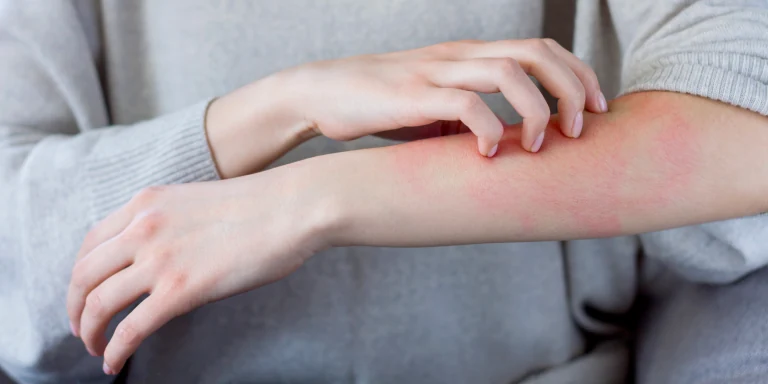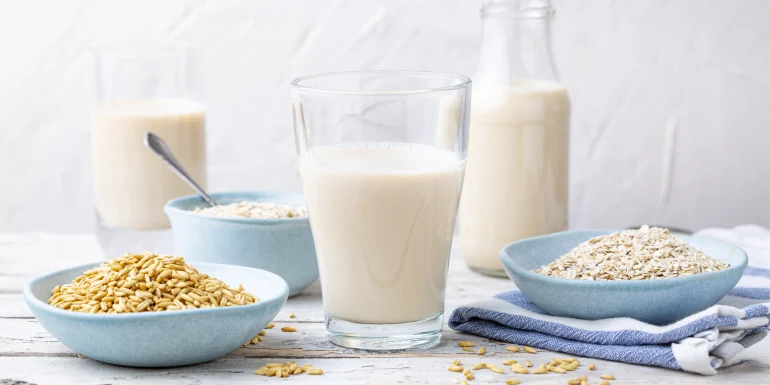
Histamine intolerance: testing and treatment
Around 1% of the Swiss population suffers from histamine intolerance. The symptoms of histamine intolerance are varied – from skin outbreaks to headaches. Find out more about histamine intolerance, its causes and treatment.
What is histamine?
Histamine is a protein that is a biogenic amine – these are biologically active substances that perform different roles in the body. For example, it acts as a neurotransmitter during an allergic reaction and controls the sleep-wake cycle, stomach acid production and blood pressure.
So what is histamine? Put simply, histamine is a substance that controls and maintains various physical processes.
What is histamine intolerance?
Histamine intolerance is where the body reacts to the substance histamine, displaying various symptoms. It is not a histamine allergy, because the immune system does react with hypersensitivity to this substance.
Histamine intolerance: what causes it?
We’ve answered the question “What is histamine intolerance?” but what about the cause? We still can’t explain what exactly causes histamine intolerance. The assumption is that there is an imbalance between histamine and the impaired activity of the enzymes diamine oxidase (DAO) and histamine N-methyltransferase (HNMT), which break down histamines. It is possible that the cause of histamine intolerance is linked to the gut. The enzyme DAO is formed in the intestinal mucosa.
Normally, the enzyme diamine oxidase (DAO) breaks down surplus histamine in the body. If this enzyme isn’t working properly, or if there is too little of it, histamine intolerance can occur. In this case, just a small amount of histamine will cause a reaction.
Based on current knowledge, researchers have ruled out the possibility of histamine intolerance having psychological causes. Nonetheless, it is possible that mental stress can amplify the symptoms of histamine intolerance.
What are the symptoms of a histamine intolerance?
The signs of histamine intolerance occur primarily during and after eating. Histamine intolerance can be associated with some of the following symptoms:
- Sudden reddening of the skin
- Itching
- Digestive problems such as stomach ache, diarrhoea, nausea and vomiting
- Dizziness and a rapid heartbeat
- Headache or migraine
- Red eyes
- Swollen lips
- For women: period problems, runny nose, sniffles
Simultaneous contact with other allergens, such as pollen, can make the symptoms worse if you have a pollen allegry.
Please note: histamine intolerance symptoms may also be related to mental health. These may include nervousness and depressive moods.
Would you like to find out more about possible symptoms of a histamine intolerance? Or do you need more information about a low-histamine diet? Our health consultation advisors are happy to help you.
How can you tell if you have histamine intolerance?
While histamine intolerance tests are available from pharmacies, they are not always reliable. That applies to other methods of testing for histamine intolerance too. For instance, if histamine is found in your stool, all that this indicates is the mere possibility of histamine intolerance.
Even if you cannot test for histamine intolerance itself, you should see a doctor if you think you are histamine-intolerant. First of all, they will rule out other food allergies and intolerances such as lactose intolerance, coeliac disease or fructose malabsorption. A food and symptom diary can help with making the diagnosis. In the next step, sufferers try a low-histamine diet, under the guidance of a medical professional. If the symptoms ease in the course of this histamine intolerance test, this would suggest histamine intolerance.
What should you do if you are histamine-intolerant?
Find out which foods actually cause problems. To do so, gradually reintroduce specific foods into your diet. This way, you can find out which foods to avoid in the future. This is the most important step in treating histamine intolerance. You cannot cure histamine intolerance, but you can learn to adapt your diet accordingly. This can help you to avoid or alleviate symptoms.
Taking tablets containing the enzyme diamine oxidase before eating can also assist. Your body can use this to break down more histamine. For acute symptoms, antihistamines can help alleviate symptoms. However, these tablets do not actively treat and cure histamine intolerance. Important: treatment should always be carried out in consultation with a doctor. Even if you are considering taking food supplements for histamine intolerance, you should consult your doctor beforehand.
What needs to be taken into account in terms of diet in the case of histamine intolerance?
Histamine intolerance: what should I eat?
There are various factors that influence the level of histamine in food. Generally speaking, food that is brewed, fermented or ripens contains more histamine. These foods often contain alcohol, vinegar, yeast and bacteria. Here are a few examples of foods with especially high levels of histamine:
- Sausages
- Canned fish
- Seafood
- Hard, soft and processed cheese
- Pickled cabbage
- Spinach
- Tomatoes
- Avocados
- Aubergine
- Ready meals
- Wine
Food that is kept warm or is warmed up again often contains a high level of histamine. If you’re following a diet for histamine intolerance, you should avoid these foods wherever possible.
Foods that release histamine
It’s not just food containing a high level of histamine that can trigger problems; foods which release histamine in the body also cause issues. These include citrus fruits, strawberries and chocolate. Because the enzyme diamine oxidase is supposed to break down other biogenic amines as well as histamine, pineapples, bananas, raspberries, oranges, kiwi, peanuts and other legumes can also lead to complaints. They all contain different biogenic amines.
Medication can also release histamine or slow down the breakdown of histamine. This includes painkillers, muscle relaxants, antibiotics and medication for high blood pressure. Once you stop taking the medication, the symptoms will often disappear.
Please note: you should only stop medication after consultation with a doctor.
Foods low in histamine
Above all, fresh and unprocessed foods contain little histamine. Food that can be well tolerated includes:
- Fresh, unprocessed or frozen meat
- Fresh, unprocessed or frozen fish
- Cream cheese
- Cottage cheese
- Quark
- All types of vegetables and fruits that are not included on the lists of foods with high levels of histamine and foods that release histamine
There are also certain nuts and seeds that you can enjoy if you are histamine-intolerant. For instance, you can eat almonds as well as Brazil nuts and pumpkin seeds if you are histamine-intolerant. These are a good choice if you want to include more protein in your diet and are looking for plant-based protein sources that are compatible with histamine intolerance. You can also eat bread if you are histamine-intolerant – but avoid bread with additives and instant baking mixes.
In short, there are countless foods you can add to your recipes if you have histamine intolerance. But if you are unsure, talk to your doctor or an SVDE dietitian. They can help you put a balanced diet in place.

The expert in this field provided the editorial team with advice and input for this article. Eliane Wyss (medical assistant and nutrition coach) works in the Helsana health consultation service. She supports customers on questions to do with nutrition and other health topics.


Newsletter
Find out more about current health issues every month and get all the information you need about our attractive offers from all Helsana Group companies * delivered by e-mail to read whenever it suits you. Our newsletter is free of charge and you can sign up here:
We did not receive your information. Please try again later.
* The Helsana Group comprises Helsana Insurance Company Ltd, Helsana Supplementary Insurances Ltd and Helsana Accidents Ltd.